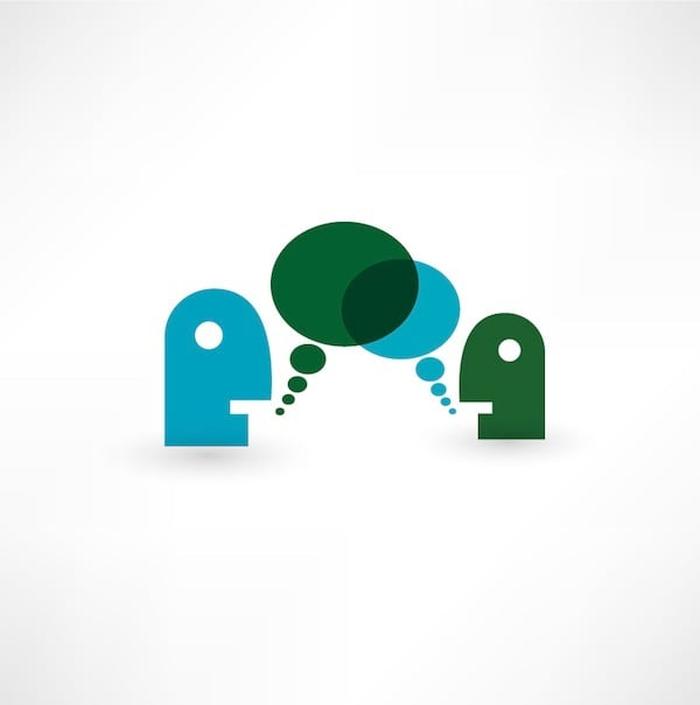
Long before humans developed language skills, we found ways to communicate with one another. Even in the absence of recognizable words, we were highly attuned to nonverbal clues (think: lots of grunts and hand gestures). We had to be if we wanted to survive.
Of course, language eventually came along on the evolutionary scale—but we still trust what we see and sense even more than the actual words we hear.
In fact only 7% of what we communicate is through words. Think about it: Remember the last your significant other was angry? He or she may have insisted, “Really, I’m fine”—but from his or her crossed arms and closed-off body language, you knew the exact opposite was true.
The same goes for interviews. Recently, I interviewed a candidate who had a fabulous resume with great experience, so I was surprised that he had spent the last six months job hunting. But as we began to talk, I immediately understood why—he kept his eyes glued to his hands, spoke in a dull, flat monotone, and rarely smiled.
Sure, he was talking about his great experience and proven track record, but truly, it didn’t matter what he was saying—it was how that was the problem.
Point is: You may have the perfect set of answers prepared, but if your body language is communicating nervousness, anxiety, boredom, or untruthfulness, your interviewer is going to sense it immediately—and it could cost you the job.
So, before you walk into your next interview, make sure you know how to take advantage of the other 93% of communication. Read on for a few tips to get you started.
Manage Your Emotional State Before the Interview
Interviews can cause even the most put-together professional to melt into a pile of emotions. It’s normal to be stressed before the big meeting, but if you communicate nonverbally in a way that makes the interviewer think, “He’s completely stressed out,” or “She has no patience,” you may not get the job offer.
To head this off, take some time pre-interview to ask yourself, “What’s my emotional state?” Once you’re more aware of what you’re feeling, you can manage those emotions—and the physical reactions they cause—more effectively.
For example, if your nerves are getting the best of you, plan to arrive at the interview at least 15 minutes early, giving you time to get calm, cool, and collected. If you’re upset about something going on in your personal life, try to re-focus your thoughts on something more positive (dream job! Great benefits! Office happy hours!), so you can be more confident and enthusiastic.
Make the First 60 Seconds Matter
You only have one chance to make a first impression—and worse, it’s a really short chance: From the moment you walk in the door, your interviewer will have an opinion of you in mere seconds. (It may seem drastically short, but do you remember the last time you were single and on the prowl? It’s amazing how quickly you’re able to hone in on a person you find interesting and dismiss all the rest.)
So, make the most of that limited time. Start by shaking hands with the interviewer firmly and confidently, and don’t forget to smile, make eye contact, and stand up straight. Your poise and self-assurance will put you in a positive light in your interviewer’s mind before the questions even start.
Pay Attention to Your Body Language
Once you’re in the interview and engaged in conversation, stay aware of what your body is communicating. As you answer questions, avoid crossing your arms (which can make you seem defensive or closed-off), and if you tend to twirl your hair, tap your pen, or engage in any other nervous tic, be vigilant about controlling it.
And when you’re not speaking, listen with your entire body. Often, interviewees will busy their minds thinking about their next response, instead of actually listening to the other person, so you can easily set yourself apart by focusing 100% on what the interviewer is saying. Your mind and body will automatically go into a listening posture by sitting up straight, leaning slightly forward, making eye contact, and nodding. Try this in your next conversation or interview, and you’ll connect in a much more meaningful way.
Pay Attention to the Hiring Manager’s Body Language
At the same time, stay conscious of what the interviewer’s body language is expressing. Is he or she slouching, jiggling a leg, or covertly texting? These signs often point to boredom, so if you see any of them, stop your monologue and bring your interviewer back into the conversation (e.g., “Does that answer your question?” or “Am I giving you the kind of information you were looking for?”). These questions will help bring him or her back into the moment and help you figure out how to better direct the conversation for the time you have left.
If you’re not sure how you currently communicate nonverbally (are you monotone? Overly excited? Nervously fidgeting?), write down a couple of questions you’d likely get asked in an interview and videotape your responses. Or, practice with a friend who will give you a truthful evaluation. Either way, when you have a firm grip on the way you say things (and not just what you say), you’ll come across as a much stronger candidate and dramatically up your chances of landing that job.